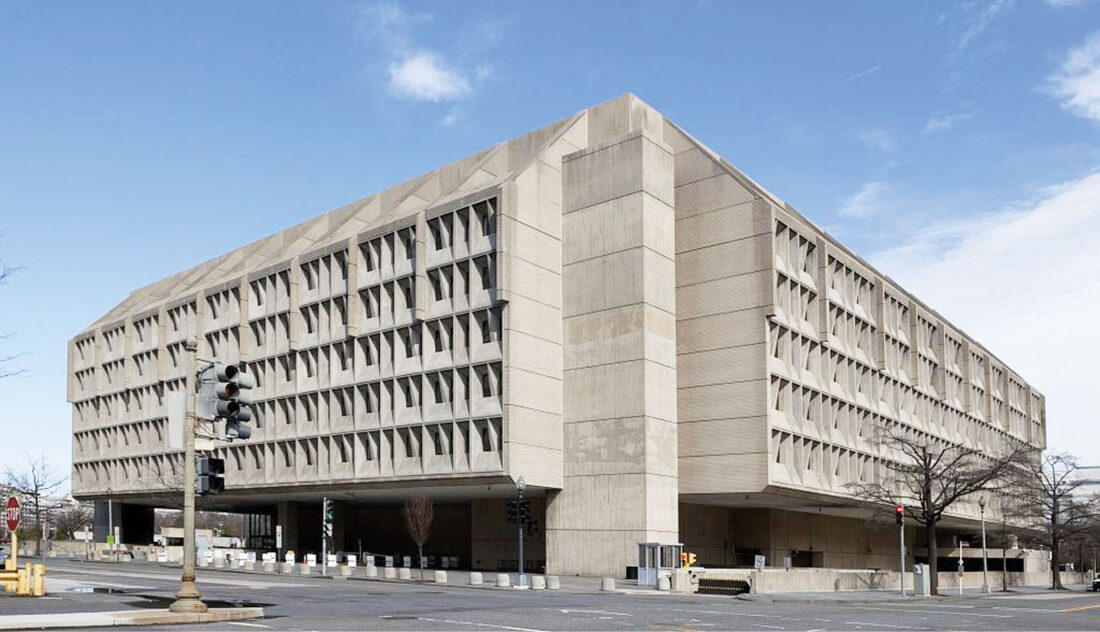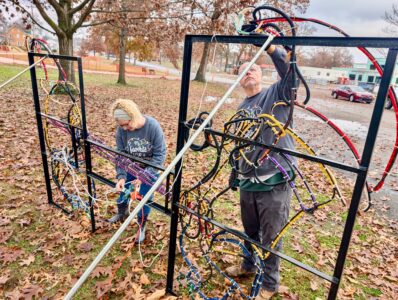Federal health watchdog threatens funding over religious vaccine exemption fight

The Hubert H. Humphrey Building, the Washington, D.C., headquarters of the U.S. Department of Health and Human Services. (Photo Courtesy/U.S. General Services Administration)
CHARLESTON — The religious exemption to West Virginia compulsory immunization law created by Gov. Patrick Morrisey’s January executive order is being litigated, with arguments before the state Supreme Court of Appeals likely.
But federal health officials are threatening funding cuts if religious exemptions are not honored.
Paula Stannard, director of the U.S. Department of Health and Human Services (HHS) Office of Civil Rights (OCR), sent a letter Thursday to the West Virginia Department of Health and local health departments reminding them of their obligations under the federal Vaccines for Children Program (VCP).
Stannard wrote that now that a religious vaccine exemption is in place, it is the duty of state and local health officials to comply with Morrisey’s religious vaccine exemption executive order and his interpretation of the 2023 Equal Protection for Religion Act which Morrisey has cited as his justification for his executive order.
“West Virginia is a participant in the VCP and receives $1.37 billion from the Centers for Medicare and Medicaid Services each year as the federal Medicaid contribution,” Stannard wrote. “Therefore, West Virginia is obligated to ensure that its VCP providers comply with applicable state laws like EPRA, which requires recognition of religious exemptions from West Virginia’s compulsory vaccination law.”
State Code 16-3-4 requires children attending public or private school to show proof of immunization for diphtheria, pertussis, tetanus, polio, measles, mumps, rubella, varicella and hepatitis B unless proof of a medical exemption can be shown. County health departments are required to provide immunizations free of charge and provide certificates showing proof of immunizations.
Medical exemptions can be approved by the state health officer who serves as the commissioner of the Bureau of Public Health. Medical exemption requests must be accompanied by a certification by a licensed doctor stating the physical condition of the child and the need for the medical exemption.
Some form of compulsory immunization law has been on the books since the 1930s.
But on Jan. 14 – one day after taking office as governor – Morrisey issued a series of executive orders, including Executive Order 7-25, ordering the Bureau of Public Health within the state Department of Health to establish a process for parents and/or guardians to seek a religious exemption to the compulsory immunization law, allowing for parents to submit to the department a signed letter as sufficient proof.
Morrisey also had a bill introduced during the 2025 legislative session earlier this year on his behalf that would have codified a religious and philosophical vaccine exemption in State Code, but while the state Senate passed the bill, an amended version of the bill in the House of Delegates was defeated in a narrow vote.
The governor issued further guidance in May to parents, guardians, and school officials on his religious exemption executive order, how to obtain the exemption for the current school year, and what information to provide to the Bureau of Public Health. But in June, the West Virginia Board of Education issued its own guidance to county school systems requiring them to only accept medical exemptions as allowed under the compulsory immunization law.
According to its website, OCR is charged with enforcing federal laws, such as civil rights laws, conscience and religious freedom laws, and the Health Insurance Portability and Accountability Act (HIPAA). But it is unclear what authority the OCR has to enforce state laws or executive orders made by governors.
“OCR enforces 26 conscience statutes applicable to various funding streams as well as 21 religious non-discrimination provisions in other federal statutes and regulations, which include a number of grant and block grant programs,” Stannard wrote. “These protections are applicable to specific health programs and cover a range of topics depending on the statute, including abortion, sterilization, assisted suicide, advanced directives, vaccines, and compulsory health services.”
The VCP was created by Congress in 1993 following a measles epidemic between 1989 and 1991. The program provides access to vaccines for eligible children age 18 or younger at no cost to enrolled public and private health care providers. Funding for the program is allocated through the Centers for Medicare and Medicaid Services to the U.S. Centers for Disease Control and Prevention, which buys the vaccines at discount and distributes the vaccines to states and territories.
“The VCP ensures that children who are uninsured, Medicaid-eligible, or otherwise meet the eligibility criteria receive qualified pediatric vaccines,” Stannard wrote. “Providers participating in the VCP must comply ‘with applicable State law, including any such law relating to any religious or other exemption.’ By specifically mandating that a State’s plan for administering Medicaid must respect State laws regarding religious exemptions, Congress recognized the importance of Americans’ religious convictions regarding vaccines and laws protecting such.”
According to the National Conference of State Legislatures, 45 states have some form of religious vaccine exemption, religious and philosophical exemptions, or an unspecified non-medical vaccine exemption for school-age children. Only West Virginia, California, New York, Connecticut, and Maine have no religious exemption codified in law.
According to the state Department of Health, 513 religious exemptions have been granted for the current school year as Friday, up from 288 exemptions granted by the end of July.
“The letter we received from the HHS Office for Civil Rights confirms the Governor’s interpretation of the Equal Protection for Religion Act and supports his executive order to grant religious exemptions,” said Gailyn Markham, a spokesperson for the state Department of Health. “We are pleased to have the support of HHS as we continue to grant religious exemptions under the state’s religious freedom law.”
Pro-vaccine and anti-vaccine proponents filed lawsuits over the summer. The ACLU-WV and Mountain State Justice re-filed a lawsuit last week in Kanawha County Circuit Court seeking an injunction on behalf of a Kanawha County parent and a Cabell County parent to prohibit the Department of Health from granting religious exemptions. Both parents have children who are immunocompromised.
A Raleigh County Circuit Court judge granted a preliminary injunction in August on behalf of three parents seeking to block the Raleigh County Board of Education and the state board from enforcing the compulsory immunization law and except religious exemptions granted for their children. Those parents are represented by several attorneys, including Aaron Siri, an informal advisor to HHS Secretary Robert F. Kennedy Jr. Siri’s law firm specializes in vaccine exemption and vaccine injury cases.
The Attorney General’s Office filed motions earlier this week seeking to combine the Kanawha County case with the Raleigh County case, which is being appealed by the state Board of Education to the West Virginia Supreme Court of Appeals. In a press release Friday afternoon, the state board said it was aware of the OCR letter and would continue to recommend schools not accept religious exemptions.
“This letter is not directed to the WVBE or West Virginia school districts and has no impact on the WVBE’s position that the current compulsory school immunization law does not contain a religious exemption,” the board said in a joint statement. “The WVBE will stay the course in its pursuit of legal relief from the West Virginia Supreme Court regarding compulsory immunizations and religious exemptions.
“This Board will continue to uphold its duties as outlined in the West Virginia Constitution and laws as established by the West Virginia Legislature,” the statement continued.
It was unclear what prompted Thursday’s letter from OCR, given that the state Department of Health has cooperated with Morrisey’s religious exemption executive order. In the letter, Stannard said her office was willing to provide assistance and support to the state to ensure health care providers comply with the executive order.
“OCR is tasked with enforcement of many of our nation’s laws that protect the rights of conscience and religious nondiscrimination,” Stannard wrote. “It is a priority of the Department to enforce these laws and help health care entities and health care providers understand these laws. OCR is available to provide technical assistance related to conscience protections, or receive complaints related to conscience.”





